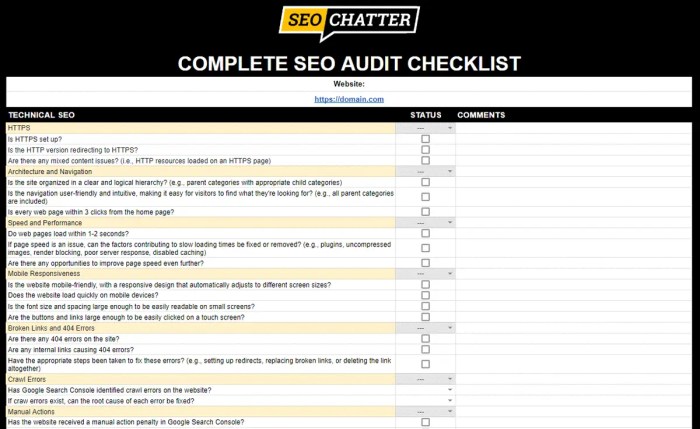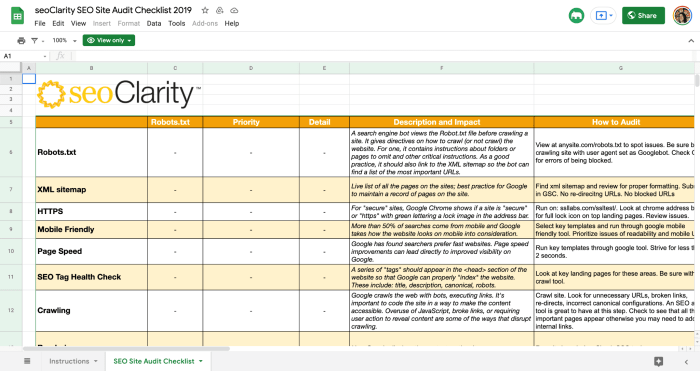Embark on a journey into the world of Audit Templates for Local Business Owners, where we unravel the importance of audits and how they can enhance the online presence of local businesses.
Delve into the key elements and successful examples of audit templates, tailored specifically for local businesses.
Audit Templates for Local Business Owners

audits are crucial for local businesses as they help identify areas for improvement in their online presence, boost search engine rankings, and drive more organic traffic to their websites. By conducting regular audits, local business owners can stay ahead of their competitors and ensure that their target audience can easily find them online.
Key Elements in an Audit Template for Local Businesses
When creating an audit template for local businesses, it should include key elements such as:
- analysis to determine the most relevant and high-search volume s for the business
- On-page optimization including title tags, meta descriptions, and content quality
- Local factors like Google My Business optimization, local citations, and NAP consistency
- Technical aspects such as site speed, mobile-friendliness, and crawlability
- Backlink profile analysis to assess the quality and quantity of inbound links
Successful Examples of Audit Templates for Local Businesses
Successful audit templates tailored for local businesses often include a combination of the key elements mentioned above. Tools like SEMrush, Moz, and Ahrefs offer comprehensive audit templates that local business owners can utilize to analyze their website's performance and make informed decisions on optimization strategies.
Utilizing Audit Templates for Improved Online Presence
Local business owners can use audit templates to gain insights into their current status, identify areas of improvement, and prioritize optimization tasks. By regularly conducting audits and implementing the recommendations from the audit templates, local businesses can enhance their online visibility, attract more targeted traffic, and ultimately drive more conversions and revenue.
Structuring an Audit Template
When creating an audit template for local businesses, it is essential to include specific sections that can provide a comprehensive overview of the website's performance and potential areas for improvement. Here are some necessary sections to consider:
1. On-Page Analysis
- Analysis: Evaluate the current s used on the website and identify opportunities for targeting relevant s.
- Meta Tags: Check the meta titles and descriptions for each page to ensure they are optimized for search engines.
- Content Quality: Assess the quality and relevance of the content on the website, including text, images, and multimedia.
2. Off-Page Analysis
- Backlink Profile: Analyze the backlinks pointing to the website and assess their quality and relevance.
- Social Media Presence: Review the business's presence on social media platforms and its impact on .
3. Technical Audit
- Site Speed: Evaluate the website's loading speed and identify any issues that could affect user experience.
- Mobile-Friendliness: Check if the website is optimized for mobile devices to meet Google's mobile-first indexing criteria.
When organizing an audit template, you can choose between a checklist format, a report format, or a combination of both. A checklist format can help ensure that no important elements are missed, while a report format allows for more in-depth analysis and recommendations.
To prioritize elements within the template, consider focusing on areas that have the most significant impact on the website's performance. This could include fixing technical issues, optimizing on-page content, and improving backlink profiles.
Customizing the audit template based on the specific needs of a local business is crucial. Tailoring the analysis to address the unique challenges and goals of the business can lead to more actionable insights and recommendations for improvement.
Tools and Resources for Conducting Audits
As a local business owner, having the right tools and resources at your disposal is crucial for conducting effective audits. These tools can help streamline the audit process, provide valuable insights, and ultimately improve your website's search engine optimization.
Essential Tools for Audits
- Google Analytics: This tool offers valuable data on website traffic, user behavior, and conversion rates, which can help pinpoint areas for improvement in your strategy.
- Google Search Console: Provides insights into how your site is performing in Google search results, identifies indexing issues, and offers suggestions for improvement.
- SEMrush: A comprehensive tool that can analyze your website's performance, track rankings, and conduct competitor research to enhance your efforts.
Role of Analytics Platforms
Analytics platforms play a crucial role in complementing audit templates by providing data-driven insights into website performance. By utilizing tools like Google Analytics and Google Search Console, you can gather valuable information on user engagement, performance, and site visibility, which can inform your strategy.
Recommendations for Resources
- HubSpot's Audit Template: Offers a comprehensive guide on conducting audits and optimizing your website for search engines.
- Moz's Beginner's Guide to : A valuable resource for understanding fundamentals and best practices for improving your website's visibility online.
Implementing Recommendations from an Audit

When it comes to implementing recommendations from an audit, local business owners need to follow best practices to ensure success in improving their online visibility and search engine rankings.
Best Practices for Implementation
Here are some best practices for local business owners to consider when implementing recommendations from an audit:
- Address technical issues first to ensure website health and performance.
- Optimize on-page elements such as meta tags, headings, and content to align with target s.
- Improve website usability and user experience to enhance engagement and reduce bounce rates.
- Build high-quality backlinks from reputable websites to increase domain authority.
Successful Application Examples
Businesses that have successfully applied changes based on audit findings have seen significant improvements in their search engine rankings and organic traffic. For example, a local bakery implemented -optimized content and improved their local , resulting in a 30% increase in online orders within three months.
Timeline and Monitoring Results
It is important for local business owners to establish a timeline for implementing changes based on the audit recommendations. Regular monitoring of key performance indicators such as rankings, organic traffic, and conversion rates will help track the impact of the implemented changes over time.
Strategies for Continuous Improvement
After implementing initial recommendations from an audit, local business owners should focus on continuous improvement by:
- Regularly updating and optimizing website content to align with evolving search engine algorithms.
- Monitoring competitors' strategies and adapting tactics to stay competitive in the search results.
- Engaging with customers through social media and collecting feedback to inform future efforts.
Ultimate Conclusion
In conclusion, the use of audit templates is a powerful tool for local business owners to boost their online visibility and attract more customers.
FAQ Compilation
How often should local business owners conduct audits?
It is recommended to conduct audits at least once every quarter to stay updated with search engine algorithms and maintain a competitive edge.
Can audit templates be customized for different types of local businesses?
Yes, audit templates can and should be customized to address the specific needs and goals of different types of local businesses for optimal results.
What are some common mistakes local business owners make when using audit templates?
One common mistake is overlooking the importance of local s and geo-targeting, which are crucial for local businesses to rank higher in local search results.
















